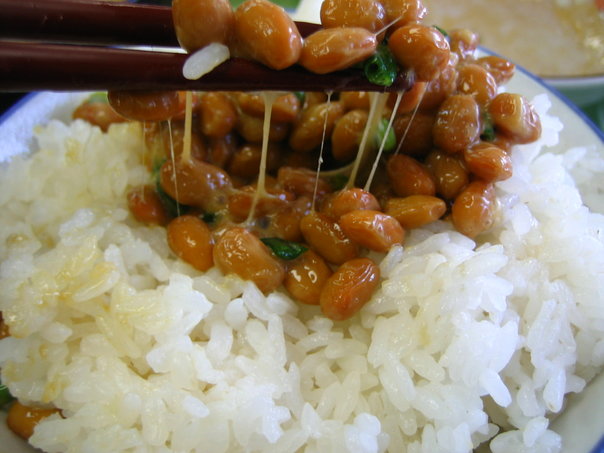Rheumatoid arthritis (RA) is one of the most debilitating chronic illnesses known to humanity. It is an inflammatory disease that affects the whole body, but mostly the joints. We know it is most likely an autoimmune disease, but so far research into causative factors has been centred around genetic predisposition; microbes; allergies; abnormal gut permeability; and diet and lifestyle factors. Now,
new research is showing that vitamin K2 may play a key role in fighting the disease.
 |
| Natto on rice. Source: Shades0404 (CC: 2.5) |
There are several forms of vitamin K. Vitamin K1 is also known as phylloquinone and comes from plant foods, while there are several types of vitamin K2, all known as menaquinone. They come from animal foods and are produced by bacteria. The most important form of K2 for commercial use is MK-7, and is known for its benefits in cardiovascular health and bone strength. It is more bioavailable than MK-4, which has been found in a clinical trial to improve the symptoms and biochemical markers of RA. To see if MK-7 would be even better, researchers divided 84 patients with RA into two groups: one receiving 100 micrograms of K2's MK-7 form, and the other getting a placebo. After three months, markers of inflammation were significantly lower in the treated group, as well as RA disease activity scores. Active levels of osteocalcin, an important marker of bone health, also improved, and all of these benefits were seen in relation to increased levels of MK-7 in the blood. These results are very important partly because of the side effects caused by drugs prescribed for RA. While the disease itself is debilitating, the drugs can be worse enough that many people have to stop taking them.
So where exactly can we get
vitamin K2, especially the MK-7 form? Besides supplements, natto and some types of cheese are sources of MK-7. Natto is a fermented soy food from Japan, and although it's very much an acquired taste, it is the best source of the best vitamin K. Some types of meat, cheese and eggs contain the MK-4 form, which is still effective, although less active. Green leafy vegetables contain vitamin K1, and are our main source of dietary vitamin K in the West. This is much less active than vitamin K2 and mainly supports homeostasis. Finally, the MK-10 and MK-13 forms of vitamin K2, which are produced by colonic bacteria, are poorly absorbed and do not provide much activity. While more research on vitamin K2 and RA are probably needed, its use against the disease looks promising, and maybe it's time to suck it up and learn to like natto.

No comments:
Post a Comment